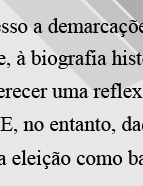

................................
The fact that academic historians had borne a considerable part of the contribution to the effort of national cohesion throughout these years, through the remembrance and rehabilitation of past themes and names, would only be the logical course of this definition of their status as authorised interpreters. This was understood, for example, by the experienced publisher Ferin, when entrusting the collection "Grandes vultos portugueses"[ Great Portuguese Figures"] to António Baião, one of the future founders of the conservative Portuguese Academy of History (APH). He was accompanied (also as author of a biography on Afonso de Albuquerque) by Brito Rebelo, Manuel Sousa Pinto, Laranjo Coelho, Francisco da Costa Cabral, and Damião Peres, another founder of the APH, later awarded a public decoration during the period of the Estado Novo, and whose published biography on King John I marked the beginning of his career. Targeting a broad audience and therefore duly simplified, the series still claimed respect for the critical spirit of the (erudite) tradition in which the works and their authors were situated. This declaration of intentions – although not always respected in practice – was, however, fundamental. It laid the foundation for an awareness of the fine line that divided fiction from reality and mere curiosity from research in the biographical genre. But above all, it echoed the most specific feature encapsulated by the historical discipline – its method – as a distinctive and validating element of the presented readings. However, the frequently expressed fear of literary artifices, such as those used by O. Martins in his major works, contained as much of methodical fastidiousness as of criticism of interpretations of national history less aligned with the celebratory and regenerative spirit of past glories (Álvaro Dória, A rainha D. Maria Francisca de Sabóia, 1944, pref. [p.14]; Carlos Maurício, A invenção de Oliveira Martins, 2005, pp.64-77).
This fear was not new: in the authors' repeated reminders of the non-fictional nature of their works. Indeed, they had been translated into a rhetorical device for decades to support the credibility of the politically implicated versions, or into a sign of an evident concern with applying the strictest rules of historical criticism, even when conditioned by burning issues of national politics. It was on this 'non-literary', or even 'anti-literary' stance that the intended neutrality rested, highlighted by João Lúcio de Azevedo, among others, in his presumed demystification of the various discourses surrounding the controversial figure of Pombal.
